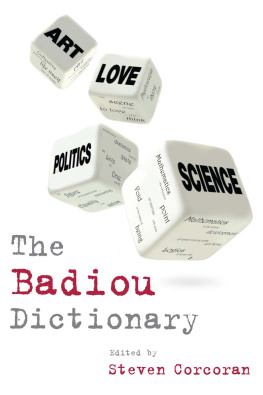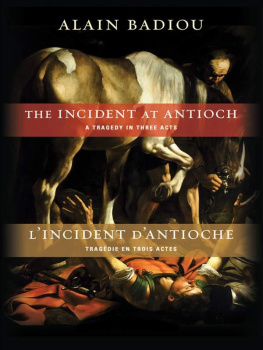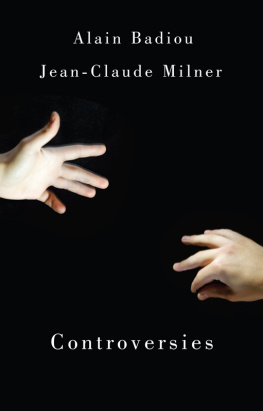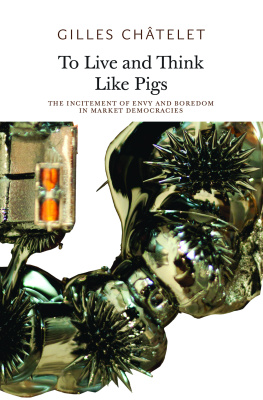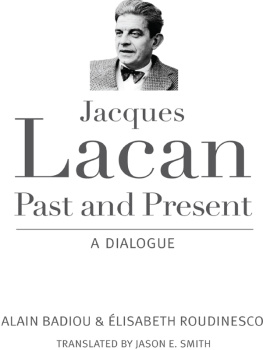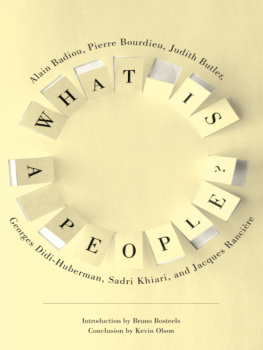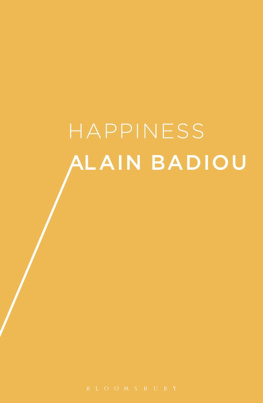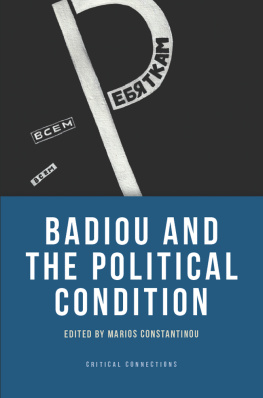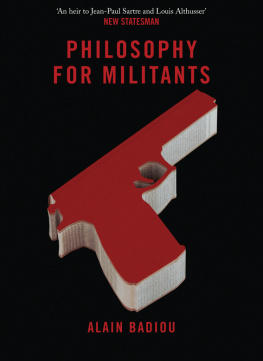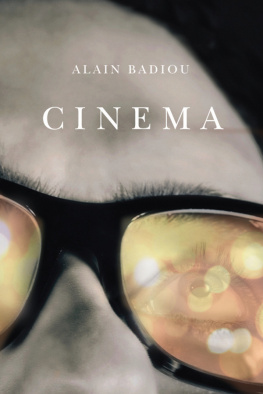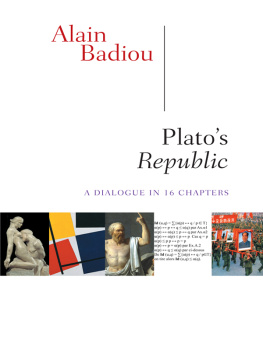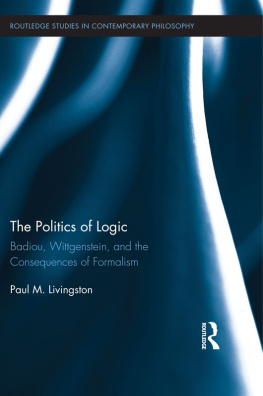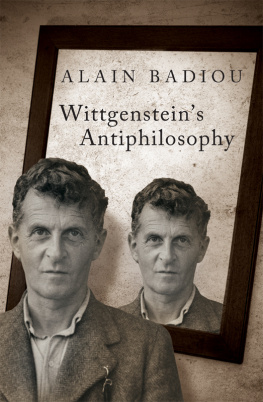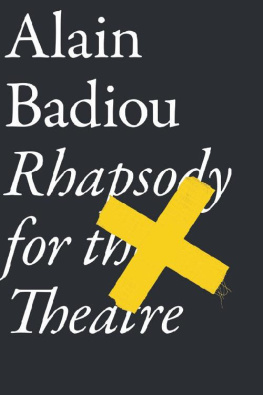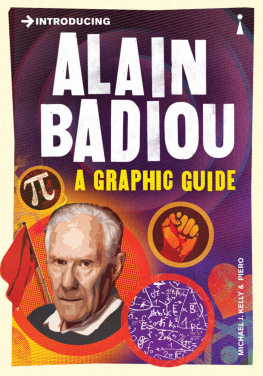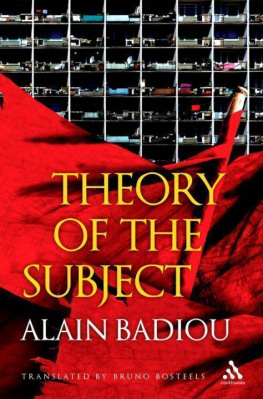
The Badiou Dictionary
The Badiou Dictionary
Edited by Steven Corcoran

editorial matter and organisation Steven Corcoran, 2015
the chapters their several authors, 2015
Edinburgh University Press Ltd
The Tun Holyrood Road
12(2f) Jacksons Entry
Edinburgh EH8 8PJ
www.euppublishing.com
A CIP record for this book is available from the British Library
ISBN 978 0 7486 6965 3
The right of Steven Corcoran to be identified as the editor of this work has been asserted in accordance with the Copyright, Designs and Patents Act 1988, and the Copyright and Related Rights Regulations 2003 (SI No. 2498).
Contents
Introduction
Steven Corcoran
Acknowledgements
I would like to thank all the contributors for their commitment, which enabled this considerable journey to take place and helped the project evolve in sometimes surprising directions. The editorial staff at Edinburgh University Press has been wonderful, and in this regard my editor, Carol Macdonald, is deserving of extra special thanks for her ultra-generous support.
As ingenious as Badious work is in its grasping of the existence of truth procedures, the point is says Rilke, to live everything. Live the questions [or ideas] now. Perhaps you will then gradually, without noticing it, live along some distant day into the answer. For the perpetual joy of ever embarking towards and returning from this distant day, my final thanks go to Joanna Kusiak.
Abbreviations
| AFP | The Adventure of French Philosophy |
| Ahmed | Ttralogie dAhmed |
| AR | Les annes rouges |
| BE | Being and Event |
| BF | Beyond Formalism |
| C | The Century |
| CCT | Can Change be Thought? |
| CD | Casser en deux lhistoire du monde |
| CH | The Communist Hypothesis |
| Cin | Cinema |
| CM | The Concept of Model |
| CS | Conditions |
| CPBT | Can Politics be Thought? |
| DCB | Deleuze: The Clamour of Being |
| DLF | De la femme comme catgorie de ltre |
| DNS | Destruction, Negation, Subtraction |
| E | Ethics |
| FB | Badiou-Finkielkraut la face-a-face |
| FP | Fascism of the Potato |
| DE | The Democratic Emblem |
| DI | De lIdologie |
| H | Heidegger: Nazism, Women, Philosophy |
| HI | Handbook of Inaesthetics |
| IA | The Incident at Antioch |
| IPL | In Praise of Love |
| IT | Infinite Thought |
| L | Lacan: Antiphilosophie 3 |
| LW | Logics of Worlds |
| MCM | Metaphysics and the critique of metaphysics |
| MP | Manifesto for Philosophy |
| M | Metapolitics |
| ML | Mark and Lack: On Zero |
| MS | Meaning of Sarkozy |
| MT | Mathematics of the Transcendental |
| NN | Number and Numbers |
| NAA | Does the notion of activist art still have a meaning? |
| OB | On Beckett |
| OD | Of an Obscure Disaster |
| OS | On a finally objectless subject |
| PAL | Platon et/ou Aristote-Leibniz |
| PE | Philosophy and the Event |
| PM | Philosophy for Militants |
| Pol | Polemics |
| PP | Pocket Pantheon |
| Rep | Platos Republic: A dialogue in 16 Chapters |
| RH | The Rebirth of History |
| RKHD | The Rational Kernel of the Hegelian Dialectic |
| RT | Rhapsody for the Theatre |
| SEM | Badious seminar series, transcriptions of which are to be found online at www.entretemps.asso.fr/Badiou/. References in the text include the year and date of the seminar (e.g. SEM 2012: October 24). |
| SG | Sophie Germain |
| SMP | Second Manifesto for Philosophy |
| SP | Saint Paul |
| TC | Thorie de la contradiction |
| TM | Third Sketch of a Manifesto of Affirmationist Art |
| TO | Briefings on Existence: Short Treaty of Transitory Ontology |
| TS | Theory of the Subject |
| TU | Eight theses on the Universal |
| TW | Theoretical Writings |
| WA | Wittgensteins Antiphilosophy |
| Wag | Five Lessons on Wagner |
| WL | What is Love? |
| WN | Who is Nietzsche? |
Introduction
Socrates: Someone whose life is a true life is happy, and even blessed. Someone whose life is disgraceful is unhappy. So weve finally arrived at this crucial statement: the just man is happy, the unjust man is unhappy. Now, being unhappy is not advantageous, whereas being happy is. So I can finally state it categorically: it is not true, Professor Thrasymachus, that injustice is more advantageous than justice.
Thrasymachus: Well, Professor Socrates can just go and party now till the sun comes up! And I, Thrasymachus, can just shut the hell up. I know how to keep quiet, my friends. Youll see what a virtuoso of rhetorics silence is like. But that doesnt mean I agree.
From Badiou, Platos Republic: A dialogue in 16 Chapters
In recent years Alain Badiou has yet again given a stunning demonstration of the timelessness of philosophy. The citation above his hypertranslation of Platos Republic, published in 2012, is a reworking for today of an essential philosophical text. Badious return to Plato is well-documented, but perhaps what was not foreseeable in this return is his renewal of a Platonic topos to which his next book, due in French in 2015, is devoted: happiness. The discussion above between Socrates and Thrasymachus on the nature of justice and happiness is not a simple chat among friends. For it is essential for the philosopher to show, against the rhetorician and his apology for injustice and power, that the happy person is the just person. Showing this sometimes requires less than fair means, as both sides try to assert their ascendency and convince the youths in attendance. Why? Because such is always the case when a fundamental decision is at stake. The discussion precisely is not so much a discussion but a confrontation, a clash of heterogeneous principles in which an essential aim is at stake. The aim of the philosopher will be to uphold to put it in Badious terms the happiness of the person that participates in a truth, against all those who in all ages affirm that the tyrant, the trickster, is the happy person, in short that injustice is the way of the world and that the just are simply nave fools. As a discourse that aspires to be more than a simple academic exercise, philosophy can win out by showing that there is an essential choice to be made here, a choice that cuts to the core of the subject. This is something that Badiou seeks to affirm: yes, philosophy, if it is good for anything, corrupts the youth, orients minds through the question of truth, promoting truth and happiness against the capitalist reduction of the world to what the Chinese call the three relations: the relation to money, the relation to social and economic success, and the relation to sex. To paraphrase Saint Paul, we might say: neither does success in these relations count nor lack of success in them but being a new creature.
Next page
